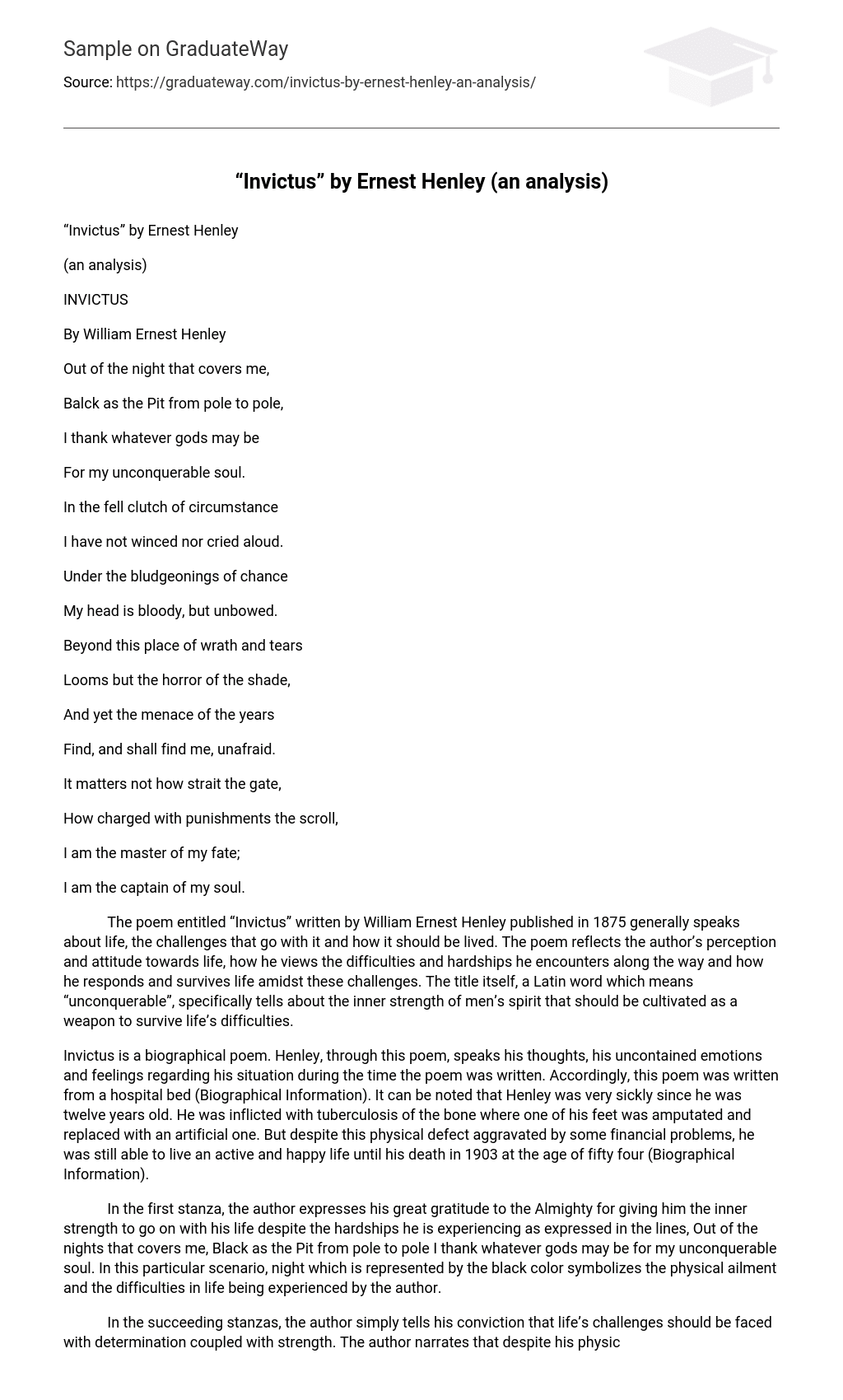“Invictus” by Ernest Henley
(an analysis)
INVICTUS
By William Ernest Henley
Out of the night that covers me,
Balck as the Pit from pole to pole,
I thank whatever gods may be
For my unconquerable soul.
In the fell clutch of circumstance
I have not winced nor cried aloud.
Under the bludgeonings of chance
My head is bloody, but unbowed.
Beyond this place of wrath and tears
Looms but the horror of the shade,
And yet the menace of the years
Find, and shall find me, unafraid.
It matters not how strait the gate,
How charged with punishments the scroll,
I am the master of my fate;
I am the captain of my soul.
The poem entitled “Invictus” written by William Ernest Henley published in 1875 generally speaks about life, the challenges that go with it and how it should be lived. The poem reflects the author’s perception and attitude towards life, how he views the difficulties and hardships he encounters along the way and how he responds and survives life amidst these challenges. The title itself, a Latin word which means “unconquerable”, specifically tells about the inner strength of men’s spirit that should be cultivated as a weapon to survive life’s difficulties.
Invictus is a biographical poem. Henley, through this poem, speaks his thoughts, his uncontained emotions and feelings regarding his situation during the time the poem was written. Accordingly, this poem was written from a hospital bed (Biographical Information). It can be noted that Henley was very sickly since he was twelve years old. He was inflicted with tuberculosis of the bone where one of his feet was amputated and replaced with an artificial one. But despite this physical defect aggravated by some financial problems, he was still able to live an active and happy life until his death in 1903 at the age of fifty four (Biographical Information).
In the first stanza, the author expresses his great gratitude to the Almighty for giving him the inner strength to go on with his life despite the hardships he is experiencing as expressed in the lines, Out of the nights that covers me, Black as the Pit from pole to pole I thank whatever gods may be for my unconquerable soul. In this particular scenario, night which is represented by the black color symbolizes the physical ailment and the difficulties in life being experienced by the author.
In the succeeding stanzas, the author simply tells his conviction that life’s challenges should be faced with determination coupled with strength. The author narrates that despite his physical condition; he never makes any tinge of regret, cries or feels sorry for it. Instead, he still lives a productive and worthy life and in fact, reaps a successful career as a poet and literary editor all throughout his years. The author’s thought regarding this concept is aptly described in the last stanza of the poem, It matters not how strait the gate, How charged with punishments the scroll, I am the master of my fate; I am the captain of my soul.
The poem Invictus and the life of William Ernest Henley serve as a beautiful inspiration to those people under similar circumstances. Through this poem, these people are encouraged to enjoy life, to face the challenges squarely and to take responsibility and full acceptance about anything that happens to them because that is their destined fate.
########
Works Cited
Biographical Information of William Ernest Henley. William Ernest Henley Webpage.
Accessed 26 Oct 2008 at: http://courses.wcupa.edu/fletcher/henley/bio.htm
Henley, William Ernest. Invictus. Accessed 26 Oct 2008, at:
http://www.wordinfo.info/words/index/info/view_unit/3981





